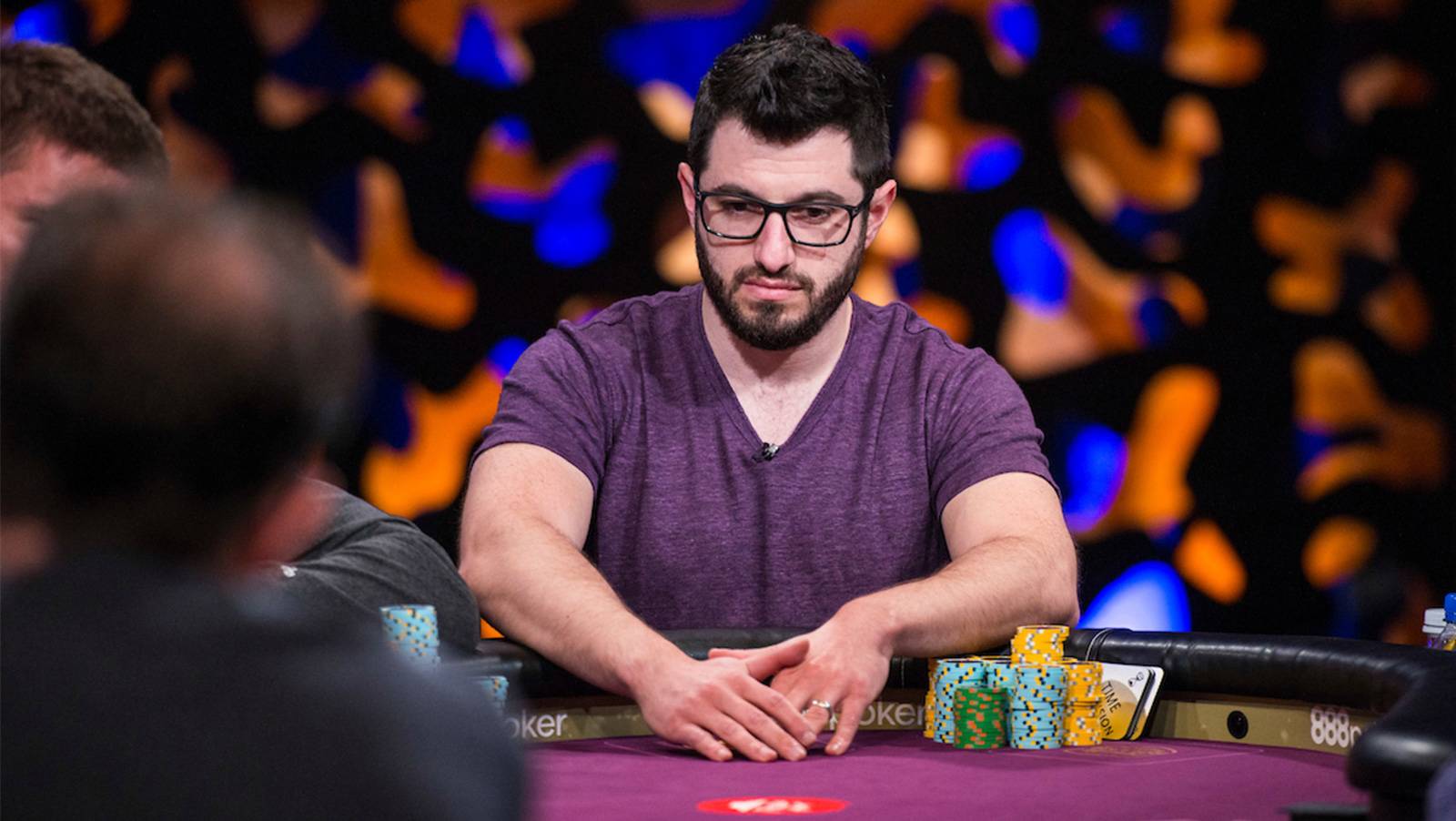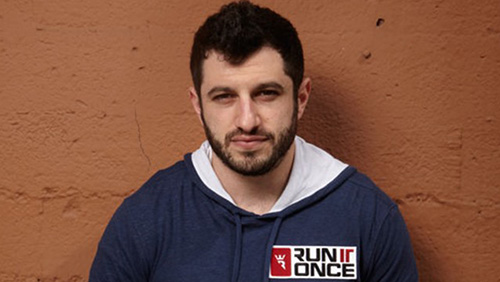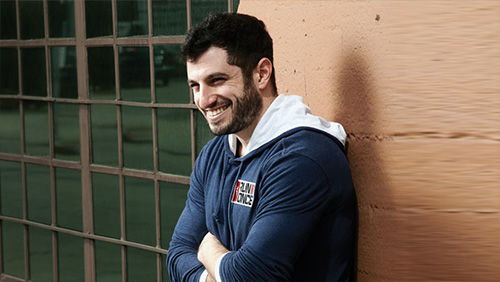Lee Davy sits down with Phil Galfond, the owner of three separate businesses, and one of the most sterling poker players on the planet, to talk about all things life.
When you think of poker and anthropomorphism, you tend to think about dogs chugging on cigars. Not me. I think about Phil Galfond. The ultimate predator. A shark. A man who has earned so much money competing at the top of the line he wouldn’t look out of place in Sotheby’s, gloved hand in the air, hoping to buy one of Coolidge’s classics.
It’s the way Galfond goes about his business that I respect. Some people prefer a ‘club the baby seals’ approach to the game. Galfond is a different kettle of shark. He prefers straight up dissection. The man approaches poker at the cellular level. His approach to th e game is microscopic, and it’s allowed him to become the foremost poker coach in the world and owner of an online poker training site that snorts fire.
e game is microscopic, and it’s allowed him to become the foremost poker coach in the world and owner of an online poker training site that snorts fire.
RunItOnce (RIO) is the market leader when it comes to top-notch online training content.
But what makes a great poker coach?
“I believe nothing is more important than strong logical reasoning skills,” Galfond tells me. “If you can break down a situation – all of the inputs – and use step by step logic to build the best decision from those inputs, you can effectively show students exactly how you make a decision. When it’s broken down like this, a student can see which inputs they failed to identify, or which dots they didn’t manage to connect to come to a decision. More importantly, they can think critically about what they’re learning and have the option to decide where they believe a coach is wrong.
“Instinct can take you far as a poker player, but showing a student how you raised because you “felt he was weak” isn’t helpful. Hard work can take you far as well, but since you can’t do the work for your students, you can only pass on the knowledge you’ve gained effectively if you can generalise and explain why certain plays are better than others or why certain boards lend themselves better to certain plays, etc.”
I fell in love with Galfond during his BluefirePoker days. I was new to the game and wanted to find a site where the very best online poker player on the planet was teaching others how to follow in his card flicking ways.
It was cutting edge stuff.
Then he left to do his own thing.
And what a great thing it was.
“We entered the market at a good time,” says Galfond talking about RIO. “We came out with higher, more reliable video release frequency, higher quality videos, and a higher quality website. The others were charging $30/mo, and we came out and charged $100/mo, but people were willing to pay because it was and still is a steal for anyone taking poker seriously.
“We’ve actually got a pretty big promotion going now where you can sign up for a year of Elite for $999 (normally $1199) and get 1 year of PokerGO ($99 value) and $100 in your Draftboard or RIO Poker account, free – so it’s temporarily even more of a steal!”
I watched Avatar again the other day. Brilliant movie. I was reading up on the background and how James Cameron had to wait years for the technology to catch up with him to turn his dreams into on-screen reality. I asked Galfond what changes he would make to RIO once the tech had caught up to his pre-frontal cortex?
“We would have RIO members practising against each other, pausing after every hand to explain their decisions and get feedback from a Ben Sulsky AI.”
Who is this man?
Sure we know how much he has won playing online cash games. We know he’s a good looking fella with a stunning wife. He is well-spoken, intelligent and charming. He’s one of the most respected players on the planet; a World Series of Poker (WSOP) bracelet winner.
But who is he?
 “Externally, the biggest positive factor in my life has been my parents,” says Galfond. “Beyond security, love, and support (which I had plenty of), my parents did a lot to shape me into who I am today, each differently.
“Externally, the biggest positive factor in my life has been my parents,” says Galfond. “Beyond security, love, and support (which I had plenty of), my parents did a lot to shape me into who I am today, each differently.
“My Dad had the most impact on me as a role model. He’s honest to a fault, hardworking, and kind. I wanted to be like him. He also taught me math several years ahead of what I was learning in school. He’s very left-brained – intelligent, logical, objective. I think I’m a bit further towards the middle than he is, but I’m wired a lot like my Dad – always living in my own head.
“My Mom’s impact on me was more deliberate. She pushed me out of my own head, got me to talk about what I was thinking and feeling, helped me understand myself and other people. The reason I knew my Dad was honest, hardworking and kind from a very young age is that my Mom always told me he was. I didn’t know my Dad when he was a student or saw him hard at work in his office. I knew about his virtues because I was told, and I learned that those qualities were admirable.
“Internally, I have a lot of self-doubts, fear of judgement and fear of failure. Some people, especially younger people, may think, “hey that’s pretty personal,” but I don’t feel that it is. Everyone reading this can name three of their own fears or insecurities on a similar level – it’s just part of being human. I think the fact that people keep things like that to themselves makes other people think there’s something wrong with them, especially younger people.
“Fears and insecurities are negatives in obvious ways, but some positives come out of them. I want to believe in myself, but I need to be really freaking good at something before I do, and I need to be even better to think that other people will see me that way. The upside of that is that it creates drive and that I’ll rarely overestimate myself or get complacent. The downside is that I’ll give up on something if I don’t excel at it quickly.
“I think a strength of mine in poker is awareness of my fears, insecurities, and other emotions driving my behaviour. It helps me fight through my emotions to make better logical decisions, and it helps me identify and adjust to the emotions driving my opponents.”
And there you have it.
The secret sauce.
Most people who tear away at our psychology come to the conclusion that our worldview is shaped before we turn seven years old. Conflict emerges between clashes of the left and right brain styles. These are dominantly male and female orientated, and the person who gets enough nurturing from both sides – the one who has enough grey matter from both – will attract you like a posh person to a chandelier.
Now we know why he is the way he is, what does he see when he looks at the world?
“I see a world full of people, mostly “good” at our core, who are scared, stressed, or unhappy, so we struggle to avoid acting selfishly.”
And when the lights go out?
“I don’t think or worry about my own death, but I’m surprised that I don’t. I worry about a lot of things all the time!
“I’m far from confident, but I think probably nothing happens after the lights go out – just nothingness. Maybe that’s why I don’t worry. If there’s nothing after this, then you feel nothing when you die – it’s neutral. It’s much harder on the living.”
It’s much harder on the living.
There is so much truth laden in this statement, and as we enter a year in which poker promises to provide more money for those in suffering than at any time in the game’s history I wonder where Galfond lies on the philanthropic spectrum with logic and reason at one end and a beating heart at the other?
“I don’t like to compare causes to each other,” says Galfond. “There’s no shortage of people in need, and no lack of ways in which people are in need. I think that you should give to whatever you feel most passionate about. I believe it’s like exercise in that over half the battle is that you just do something and that it’s something you’re likely to keep doing.
“If you donate to a cause that doesn’t speak to you because someone told you it’s important, you aren’t going to get as much of that “I did something good” warm feeling. There’s nothing wrong with feeling good about yourself for being charitable, or even with giving only because it makes you feel good. The better you feel, the more likely you are to do it again – everybody wins.
“I’m most passionate about education. I think that preparing future generations to make better decisions will lead to a better world. I believe that the majority of people are ill-equipped to make good decisions and that it isn’t that hard to give kids better tools – that’s what the book I will probably never complete would attempt to do.”
There is a lot going on in the world at the moment. It’s both exciting, hair pulling and nail-biting. I ask Galfond his views on the current gold rush fever of cryptocurrency.
“I have a little. I find it fascinating, but I don’t have the time to become very knowledgeable. I wish I did,” says Galfond. “I think that blockchain technology and gambling make a lot of sense together in the future (a little less so for poker than pit games), but I think it won’t be viable as quickly as some others believe.
“I’m bullish on the space as a whole, but I worry about scarcity with so many cryptocurrencies being created each month. It seems obvious to me that the majority are destined to fail. That said, I’m no expert.”
And the #MeToo phenomenon?
“I think it’s essential, and I’m not just saying that because it’s a good thing to say,” says Galfond. “Many of my closest friends over the years have been women, and I consider myself more sensitive and empathetic than the average guy. Given that, I’m embarrassed to say that I was shocked at how often men are doing terrible things to women. It seems 5 to 10 times as commonplace as I’d assumed. In that sense, no other movement has raised my awareness as much as #MeToo has, and I can’t be the only one.”
I think it’s clear that Galfond’s circuitry comes from a motherboard evenly plugged with core values from both the matriarchal and patriarchal states of being. There is a balance with the guy, and it’s what makes him so appealing. It’s energy transference. When you’re in his company or read something he has decided to pour thought into, you are attracted to it.
So how does that balanced way of being exist in an industry that can accuse a primary figure like Leon Tsoukernik of reneging on millions of dollars in loans while at the same time celebrate him as a poker prince?
“Scandals are neverending, and it is disheartening,” says Galfond. “I don’t ever feel like leaving poker. I love the game too much, but it is part of why I prefer online poker to live – it’s just more purely about playing the game. I don’t think much can be done other than people speaking up and warning others, and I don’t think scandals in poker will ever stop for the same reason that there will always be people robbing, killing, embezzling, etc. It’s not unique to poker.”
And Chris Ferguson?
“His performance was certainly impressive,” Galfond acknowledges. “I had spent a little bit of time with Chris before the Full Tilt Poker (FTP) scandal. He always struck me as a great guy, so I find myself making excuses for him in my head… maybe he didn’t know what was going on… maybe his lawyers told him he couldn’t make any statements.
“I do believe him not knowing what was going on with FTP finances is more plausible than others seem to think. He was in charge of the software, right? And he still was playing a lot of poker. It’s not at all far-fetched to believe that he had no interest in dealing with company finances and trusted his partners to be doing the right thing. If that were the case, you could call it negligence, but certainly not theft or fraud.
 “I really do wish he’d have said something to the community. I didn’t really like what Howard {Lederer} had to say, but at least he said something.”
“I really do wish he’d have said something to the community. I didn’t really like what Howard {Lederer} had to say, but at least he said something.”
What impressed me the most about Ferguson’s POY win was his long-term absence from top quality tournament play. The man with the hat was gone for a long time and then came back and beat the crap out of everyone.
I ask Galfond how he manages to stay on top of his game?
“I’m learning all the time. I’ve dedicated myself to poker for over 14 years, and I’m still constantly learning,” says Galfond. “In business, I’m a fish! I’ve gone from a business with a handful of employees to three businesses with dozens of employees. I have a ton to learn, and I don’t think that will slow down anytime soon.
“I usually learn best from experience. In poker that’s not really a problem, but in business, you have to be a little more careful. Trial and error are more dangerous when you’ve got people relying on you. Hopefully, I’m learning fast enough!”
And why does he still play poker?
Three business, enough cash to last him a lifetime if efficiently managed. Scandals.
“Would it be too cheesy to say playing poker makes me feel “alive?” I really love the game. I love when I can just sit and play. I don’t like when I have to think about the politics of live games or beating seat scripters in online games. I just want to be playing and thinking about nothing but the hand I’m in. When I’m doing that, fully focused, it feels amazing.”
Several years ago, Daniel Negreanu touted Galfond as the next great ambassador of our game. I agreed. There was nobody more perfect to fit the spot. I thought the game would be in honest hands.
And then nothing.
Poof.
Gone.
So I asked, Galfond, for his views on Negreanu’s comments at that time.
“I used to talk about changes that needed to be made in online poker, but now I’m trying to make them myself,” says Galfond. “There have been a lot of things that poker sites have done recently that I want to comment on, but as I’m working to be a competitor, I feel like it would come off as disingenuous. Once I’m speaking as an operator, I’m no longer speaking as a player – I’m biased – so I feel like I’ve disqualified myself from a lot of the discussion.”
This interview has been devoid of content on RIO Poker, and that’s because, at this time, there isn’t any information to give you. However, this final comment from Galfond reminds me of a quote by Elon Musk’s biographer, Ashlee Vance, where he talks about Musk’s brand of empathy being unique.
“He seems to feel for the human species as a whole without always wanting to consider the wants and needs of individuals.”
Galfond is the same when it comes to poker.
Don’t mistake his silence for not caring.
He cares.
It takes time for a shark to learn how to stop eating fish. But if one shark can, it’s this shark.





